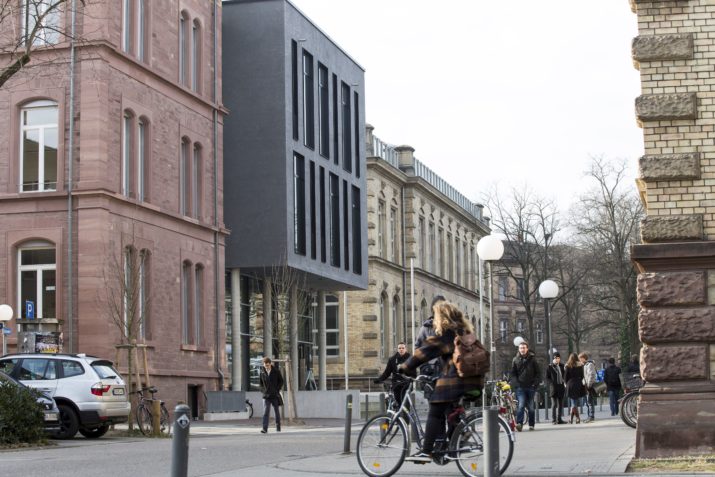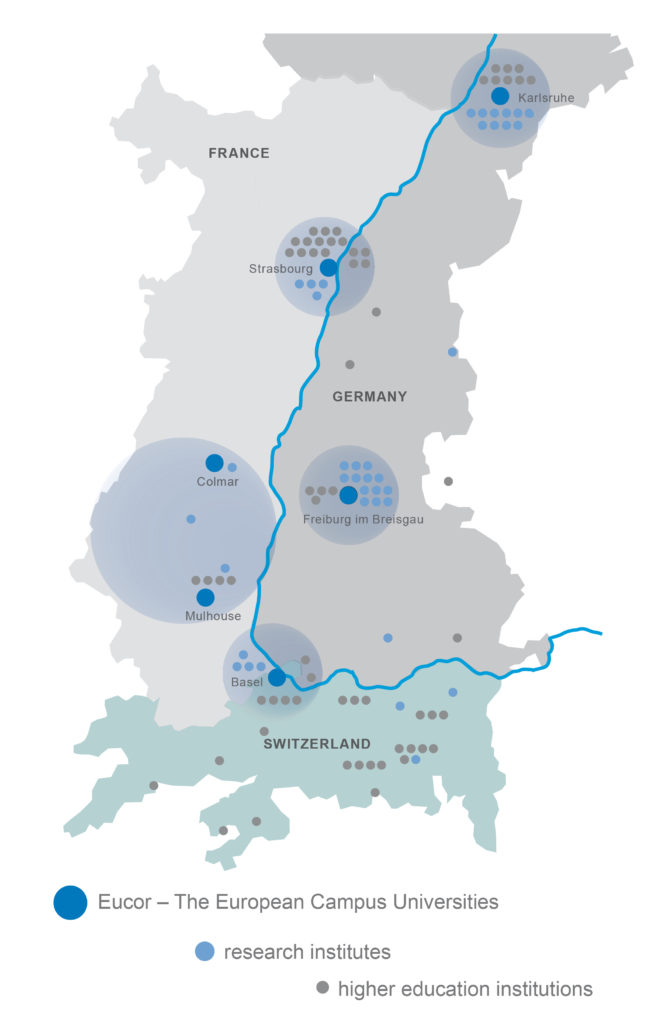

This is part of our Campus Spotlight on Eucor – The European Campus.
5 Universities, 3 Countries, 1 Campus
In the heart of Europe, tradition meets innovation. In the trinational Upper Rhine region, shared by Germany, France, and Switzerland, five universities within a distance of only 200 kilometers are forming a European Campus. With the European Campus, the Universities of Basel, Freiburg, Haute-Alsace, and Strasbourg and the Karlsruhe Institute of Technology are developing a research and science hub of international importance. This economically strong and culturally important region is also home to another 50 research facilities and 63 institutions of higher education.
On the Path to a European University
French president Emmanuel Macron has sparked off a dynamic new development in European science policy. In a European policy speech in September 2017, he called for the establishment of at least 20 European universities. German chancellor Angela Merkel responded to Macron’s proposal in May 2018 and acknowledged the cooperation between the universities on the Upper Rhine. There is as yet no final decision as to what these European universities will look like, but Eucor – The European Campus will serve as a model for them.
The distinctive feature of the university alliance is that it impacts the participating universities not just in individual academic fields but in their entirety – in research, instruction, innovation, and administration. What this means in concrete terms is that the participating universities coordinate their planning and strategies and submit joint proposals in Europe, Germany, France, and Switzerland. The universities share infrastructure for easier cooperation in research and instruction. There are joint course offerings with joint degrees, and there are plans to set up joint service departments. The vision is to make cross-border mobility into an everyday European experience for students and researchers alike. The entire trinational center for education and research is open to international top researchers, early-career researchers, and international students.
Cross-Border Research Enables Innovation and Knowledge Transfer
Eucor – The European Campus facilitates cross-border research. It is more important than ever before to coordinate efforts in science and research, particularly in view of the complexity of the issues facing society today. The universities on the Upper Rhine complement each other in their specialized academic expertise and intensify each other’s excellent research performance through close cooperation. The European Campus has defined common research priorities in which their research groups are particularly competitive on the international stage:
- Quantum Science and Technology
- Precision Medicine
- Sustainability Research
- Cultural Studies
Exemplary Cooperation: Sustainability Research on the Upper Rhine
The Upper Rhine Cluster for Sustainability Research provides a concrete example of what this cross-border cooperation in research can look like. Here, researchers from France, Germany, and Switzerland are addressing the manifold aspects of the issue of sustainability across the boundaries of nations and academic disciplines. After all, the wind does not stop blowing when it reaches the border from France to Germany or Switzerland. The lines that carry the power generated by wind energy, on the other hand, are governed by national boundaries. The generation of electricity is regulated by national laws. Its consumption is influenced by differences in the daily routines and the values of citizens in the three countries.
“Governance of sustainable growth” is how the research alliance refers to its overarching theme. The projects of the cluster are divided into five so-called profile areas: governance, power and infrastructure, societal change and innovation, resource management, and issues surrounding multiculturalism and multilingualism in sustainable development.
One concrete project, which is being conducted by the cluster, is “Synergies from an Integrated Renewable Energy Supply and Storage System in the Upper Rhine Region.” It was initiated in Freiburg, and all member universities of Eucor – The European Campus are involved. The researchers are investigating how power from renewable energies on the Upper Rhine is distributed, stored, and consumed and whether it might be possible to bring about change via this power source in the future – in a cross-border effort. The goal is to make the Upper Rhine into a trinational model region for renewable energy and to conduct an interdisciplinary analysis of the necessary framework conditions for accomplishing this task. Besides studying the generation, possibilities for storage, and the consumption of power in the entire region, the participating researchers are also addressing the legal obstacles to cross-border cooperation, including the general economic and political conditions and sociological aspects. It is not just science but society as a whole that ultimately stands to benefit.
Student Mobility and Multilingualism
The university alliance Eucor – The European Campus does not just facilitate cross-border cooperation between researchers. It also offers students a European experience in their everyday lives, because at the European Campus, teaching and learning transcend institutional and national boundaries. Students can take advantage of the course offerings of all five member universities, and lecturers can offer cross-border courses.
What makes all of this possible are two different kinds of mobility. First of all, the students enjoy free mobility, meaning that they can make up their schedule “à la carte.” They can take single courses or complete entire modules at the five universities in France, Germany, and Switzerland. This expands the range of courses available to them while at the same time fostering their language skills and intercultural competencies. A student matriculated at one of the universities can also move around at the other four member universities as if they were his or her home university. Besides being able to take courses at the other universities, the students are also free to use their libraries, cafeterias, online services, etc.
The Model Degree Program Regio Chimica
The second kind of mobility is the firmly integrated mobility in joint binational or trinational degree programs, which include periods abroad on the European Campus, and often lead to degrees from two or three member universities. An example of such a program is the binational degree program “Regio Chimica.”
This bachelor of chemistry program is a joint degree program of the University of Freiburg and the University of Haute-Alsace. The students complete part of their studies at the French university and the other part at the German university and earn a dual degree. As a special feature, the curriculum does not just include chemistry courses in two different languages – there are also courses focusing on interculturalism and regional studies. Equipped with this education, the roughly 100 graduates are optimally prepared for the job markets in both countries.
Student Initiatives on the European Campus
Student events breathe additional life into the European Campus. Two regularly recurring highlights are the Tour Eucor and the Eucor Festival. At the annual Tour Eucor, students, employees, and alumni go on a cycling tour between the cities of the European Campus, covering a distance of almost 900 kilometers through the three countries. At the Eucor Festival, students from all five member universities get together to celebrate and enjoy live concerts by student bands from Germany, France, and Switzerland.
An Established Partnership
The European Campus was founded against the backdrop of a longstanding trusting partnership between the universities on the Upper Rhine that started all the way back in 1989 with the establishment of the Eucor network. In 2013 the presidents of the participating universities resolved to draw up a common research strategy and to develop the partnership further in the direction of a “European Campus.” In December 2015 the five member universities signed the founding documents for a European Grouping of Territorial Cooperation (EGTC) by the name of “Eucor – The European Campus.” It is the first EGTC to be run exclusively by universities, a unique entity in the European research area. By virtue of this common European legal personality, the universities maintain their autonomy but can act together under the name “Eucor – The European Campus.”
An important element in realizing the purpose of the European Campus is several Interreg projects that are currently shaping the university partnership. Interreg is a program under the European Fund for Regional Development that provides structural support for cross-border cooperation. In this way, the European Union is contributing a total of 6.5 million euros in funding for the European Campus.
The Five Universities of Eucor – The European Campus
Founded in 1460
12,873 students
The University of Basel is the only Swiss partner university in the European Campus. With its seven faculties, the oldest university in Switzerland offers a broad spectrum of academic disciplines. It also competes on an international level with its five strategic focal areas: Life Sciences, Visual Studies, Nanoscience, Sustainability and Energy Research, and European and Global Studies.
Founded in 1457
24,892 students
Freiburg is known as the “Green City” and is famous for its Black Forest mountains, high environmental standards, and (of course) its university, which is one of Germany’s oldest. From the humanities and engineering to the University Medical Center, which is one of the largest medical facilities in Europe, the comprehensive university offers ideal conditions for research and teaching and has produced 23 Nobel Prize winners, ten of whom served as University of Freiburg professors.
Founded in 1975
9,694 students
The University of Haute-Alsace consists of several campuses located in Mulhouse and Colmar. This young university was formed through a merger of several older higher education institutions in Mulhouse, including the École Nationale Supérieure de Chimie in Mulhouse (ENSCMu), which was established in 1822 and is the oldest school of chemistry in France. The main focus of the University of Haute-Alsace is on the natural sciences and engineering.
Karlsruhe Institute for Technology
Founded in 2009
25,495 students
The Karlsruhe Institute of Technology (KIT) was established in 2009, when the Karlsruhe Research Center and the University of Karlsruhe were merged. As “The Research University in the Helmholtz Association,” KIT fully exploits the synergic potential resulting from combining the tasks of large-scale national research with those of a state university regarding research, teaching, and innovation. With about 9,300 employees and an annual budget of around 850 million euros, KIT is one of Europe’s major institutions of research and higher education in natural sciences and engineering.
Founded in 1621
50,104 students
The University of Strasbourg is the most international of all French universities after Paris. 20 percent of its entire student body, including PhD candidates, are from abroad. Founded in 1621, the university boasts a colorful French-German past. The University of Strasbourg is characterized by its interdisciplinary research, its wide-range of degree programs, its many cultural events. Four Nobel Prize winners are doing their research at the University of Strasbourg. In 2016, it became one of three universities in France to be selected as a permanent Center of Excellence.
Janosch Nieden is the Director of the trinational university grouping “Eucor – The European Campus”. Previously he worked in cross-border higher educational cooperation for the trinational metropolitan area of the Upper Rhine region. As a scholar of politics and government with degrees from the University of Potsdam and Sciences Po Paris, he has also worked at the École Nationale d’Administration in Paris and Strasbourg.
Photo:Andrea Fabry




